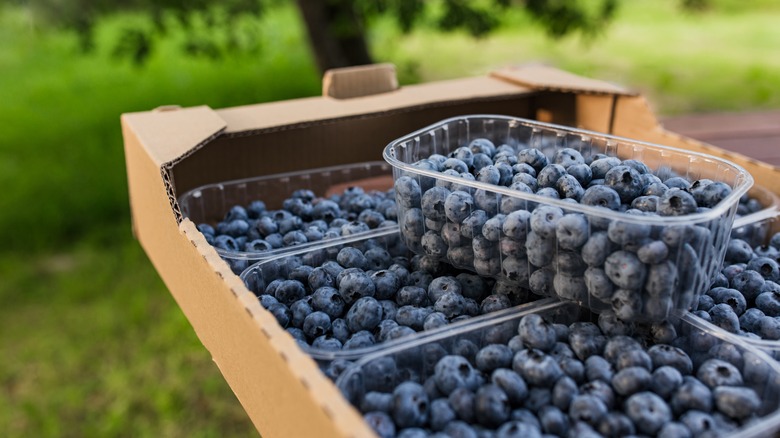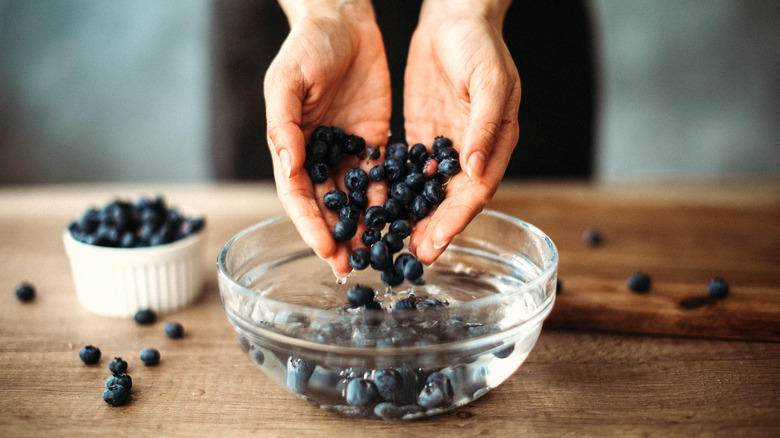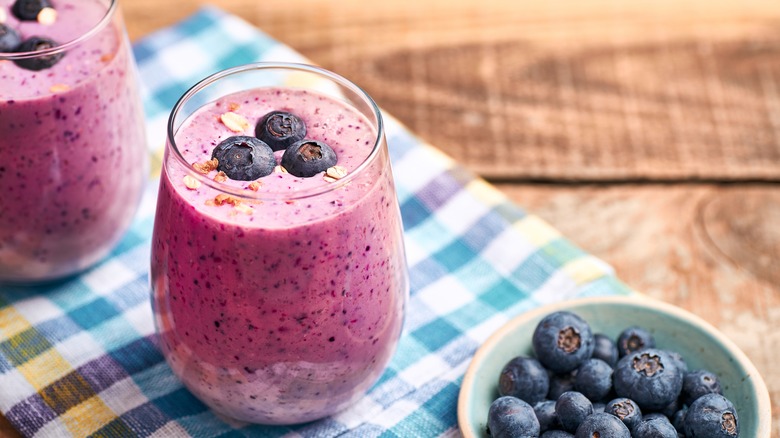The Rinsing Hack To Sort Out The Sweetest Blueberries In The Pack
Blueberries are a top-tier fruit, whether enjoyed on their own or in a mouthwateringly sweet blueberry muffin recipe. Considered a superfood, this tiny berry is low in calories but rich in fiber, vitamins C and K, and antioxidants. Blueberries make a fantastic addition to any diet, as they can improve your heart health, brain function, muscle recovery, insulin sensitivity, and much more. But like with any fresh fruit, it's only natural that you'll want to eat the ripest and sweetest blueberries possible.
While the ripeness of produce can often be determined by smell, color, firmness, or even sound (in the case of watermelons), these berries can be difficult to evaluate with just your senses. That is, unless you're willing to risk your tastebuds, as bursting a tart berry between your teeth will likely leave you scowling. Besides their sour flavor, less-ripe blueberries can appear more green and purple than the ideal blue-gray; they're also harder to squish between your fingers. Ripe blueberries are sweet and soft, possibly boasting a white-gray sheen. Even then, it's still easy to be deceived when you pop one in your mouth, as each individual berry is unique.
Fortunately, there's one simple hack to determine which blueberries are sweet and which are sour — all you need is water. Interestingly enough, the ripe and sweet berries will sink to the bottom, while any underripe and sour berries will float. The science behind this hack is relatively straightforward.
Sweet blueberries sink, sour berries float
It sounds too good to be true that a bowl of water is the easiest method to check whether your blueberries are ripe or not, but the explanation is simpler than you might think. It all comes down to how much sugar is in each berry. According to Allrecipes, "Because of the sugars, a ripe blueberry has a greater specific gravity than water, so a ripe blueberry will sink in water." On the other hand, an underripe (and sour) blueberry has less sugar and lower specific gravity than water, causing it to float.
This idea is well-supported by technology in the blueberry industry, too. Since the 1980s, hydrodynamic blueberry sorting machines have tested the ripeness of harvested berries based on whether they float or sink. At the time, this was considered common practice. Nowadays, however, most blueberries sold in grocery stores go through quality checks on a series of conveyor belts. This water-free sorting method helps limit losses and can help keep blueberries fresh for longer.
To ensure that the berries hold up better and longer in the fridge, blueberry suppliers might give you some underripe berries. Though, it might be a worthwhile sacrifice — especially since you don't need an industrial machine to separate sweet and sour blueberries at home. Plus, there's still plenty you can do with less-ripe blueberries.
What to do with underripe blueberries
After solving the mystery of which blueberries are ripe and which aren't, you may be wondering what to do with them. For the satisfyingly ripe and sweet berries, feel free to indulge in a healthy snack or get straight to baking. (If you do put them back in the fridge, dry the berries thoroughly to keep them from getting mushy.) But for the less-ripe berries that you're not as keen to eat, we have a few suggestions.
It's worth a shot to see if sour blueberries will ripen with extra time. Unlike ethylene-producing fruits like apples and bananas, berries don't usually ripen after being picked — particularly if they're harvested before reaching a mature color or size. However, research published in Plant Science indicates it's not impossible. To encourage the process, blueberry farmers suggest leaving out underripe berries at room temperature or storing them with an apple.
If you aren't successful at ripening too-tart berries, there are other ways to use this fruit. Since blueberries can be stored in the freezer for up to 10 months without losing their health benefits, mask their sour flavor by tossing them in a produce-packed smoothie. Alternatively, you can sweeten your bland blueberries by macerating them. The mixture you'll be left with can be used in all kinds of blueberry recipes. No matter what you do with underripe blueberries, there are plenty of opportunities to get creative. Sweet or sour, there's no need to let berries go to waste.


